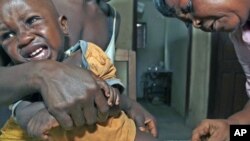Private donors and world leaders attending a conference in London June 13 pledged nearly $5 billion to the Global Alliance on Vaccines and Immunization, or GAVI. The pledges were $1 billion more than requested and over the next four years will help pay to vaccinate more of the world's children against killer diseases.
The philanthropists, corporate executives and political leaders meeting in London together pledged $4.7 billion to fund vaccination programs in low-income developing countries.
David Ferreira of the Global Alliance for Vaccines and Immunization calls the pledging session a historic milestone in global health.
“A huge victory for the global community and a huge vote of confidence in the power of immunization and the commitment of the global community to immunize the world’s children," he said.
Ferreira says the additional funds pledged in London will help GAVI broaden the availability of the so-called pentavalent vaccines that protect children against five deadly diseases, and to immunize more children against pneumonia and diarrhea.
“Believe it or not, pneumonia and diarrhea are two leading killers for children under five on the planet," he said.
GAVI also plans to develop new vaccines against other killer diseases. Peter Hotez, president of Sabin Vaccine Institute, says that in addition to researching new vaccines for malaria, typhoid and dengue fever, he's hopeful GAVI can focus on neglected tropical diseases. Those infections affect more than a billion people around the world.
“These vaccines will not only improve health but will lift people out of poverty. That’s why we call these neglected tropical diseases vaccines the anti-poverty vaccines," he said.
Hotez says 70 percent of the world’s neglected tropical diseases occur in countries of strategic interest to the United States, and collaborating on vaccination programs could help to bridge some wide diplomatic gaps.
“For instance the Iranians will love to make Leishmaniasis vaccine, the Indonesian Schistosomiasis vaccine. Why aren’t we working with them as a form of science diplomacy or vaccine diplomacy? It is a great opportunity to have," he said.
Health officials hope to vaccinate more than 250 million children over the next several years and save about four million lives.




